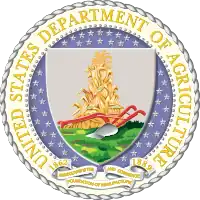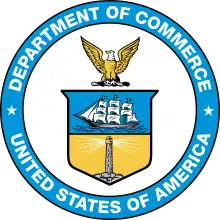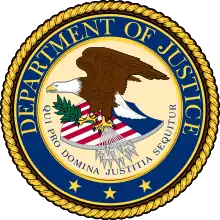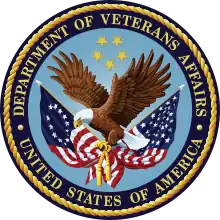
The federal government of the United States empowers a wide range of federal law enforcement agencies (informally known as the "Feds") to maintain law and public order related to matters affecting the country as a whole.[1][2]
While the majority of federal law enforcement employees work for the Department of Justice and Homeland Security, there are dozens of other federal law enforcement agencies under the other executive departments, as well as under the legislative and judicial branches of the federal government.
Federal agencies employ approximately 137,000 full-time personnel authorized to make arrests and/or carry firearms in the 50 states and the District of Columbia,[1] out of the more than 800,000 law enforcement officers in the United States.[3]
Overview
Federal law enforcement in the United States is more than two hundred years old. For example, the Postal Inspection Service can trace its origins back to 1772,[4] while the U.S. Marshals Service dates to 1789.[5] Other agencies, such as the FBI, are relatively recent, being founded in the early twentieth century. Other agencies have been reformed, such as the ATF which was started only in 1972, but had its origins in 1886. Some federal law enforcement agencies have been formed after mergers of other agencies, over the years. This includes the CBP, ATF, and the DEA.
Military law enforcement, although federal, consists of both military personnel and civilian officers. For example, "DOD Police" refers to any civilian engaged in police duties for the DOD or the US Armed Forces. Each branch also has a law enforcement agency responsible for the investigation of more serious crimes and incidents, such as the Army’s Criminal Investigation Division.
Different federal law enforcement authorities have authority under different parts of the United States Code (U.S.C.). Most are limited by the U.S. Code to investigating matters that are explicitly within the power of the federal government. There are exceptions, with some agencies and officials enforcing codes of U.S. states and tribes of Native Americans in the United States. Some federal investigative powers have become broader in practice, especially since the passage of the USA PATRIOT Act in October 2001.[6]
The United States Department of Justice was formerly the largest and is still the most prominent, collection of federal law enforcement agencies. It has handled most law enforcement duties at the federal level[7] and includes the United States Marshals Service (USMS), the Federal Bureau of Investigation (FBI), the Drug Enforcement Administration (DEA), the Bureau of Alcohol, Tobacco, Firearms and Explosives (ATF), Federal Bureau of Prisons (BOP), and others.
However, the United States Department of Homeland Security (DHS) became the department with the most sworn armed Federal law enforcement officers and agents upon its creation in 2002 in response to the September 11, 2001 terrorist attacks when it incorporated agencies seen as having roles in protecting the country against terrorism. This included large agencies such as U.S. Immigration and Customs Enforcement Homeland Security Investigations (HSI), the U.S. Secret Service (USSS), the U.S. Coast Guard (USCG), the Transportation Security Administration (TSA), and the U.S. Customs and Border Protection (CBP) (created by combining the former agencies of the United States Border Patrol, United States Customs Service, and the United States Department of Agriculture's Animal and Plant Health Inspection Service (APHIS) into a single agency within the DHS).[2]
Statistics
- In 2020, federal agencies employed approximately 137,000 full-time personnel authorized to make arrests and/or carry firearms in the 50 states and the District of Columbia. Around half (49%) of the personnel worked for the Department of Homeland Security, and 30% worked for the Department of Justice.
- Federal officers' most common primary function was criminal investigation or enforcement (68%), corrections (25%), and police response and patrol (9%).
- Around 15% of federal law enforcement officers and 13% of supervisory law enforcement personnel were female in 2020.
- More than a third (38%) of federal officers were members of a racial or ethnic minority in 2020. This included 21% who were Hispanic or Latino, and 10% who were black or African American. In 2002, racial or ethnic minorities officers constituted 32.4% of federal officers.
- About 60% of federal agencies authorized shotguns or manual rifles for officers while on duty in 2020. Fifty percent authorized semiautomatic rifles and 20% authorized fully automatic rifles for officers while on duty.[1]
List of federal law enforcement agencies and units of agencies
Agencies in bold text are law enforcement agencies (LEAs).
Executive Branch
Department of Agriculture

- Staff Offices Secretary of Agriculture
- Office of Safety, Security and Protection (OSSaP)[8]
- Office of Inspector General (USDA-OIG)
- United States Forest Service (USFS)
Department of Commerce


- Office of Inspector General (DOC-OIG)
- Office of Security (DOC OS)
- US Commerce Department Police
- Bureau of Industry and Security (BIS)
- National Institute of Standards and Technology (NIST)
- National Institute of Standards and Technology Police
- National Oceanic and Atmospheric Administration (NOAA)
Department of Defense

- Office of Inspector General (DOD-OIG)
- Pentagon Force Protection Agency (PFPA)
- Department of Defense Police (DoD Police)
- Defense Logistics Agency (DLA)
- National Security Agency (NSA)
- Defense Intelligence Agency (DIA)
- National Geospatial-Intelligence Agency (NGA)
- National Geospatial-Intelligence Agency Police (NGA Police)
- Department of the Army
- United States Army Criminal Investigation Division (USACID)
- United States Army Counterintelligence (ACI)
- United States Army Military Police Corps (USAMPC)
- Department of the Army Civilian Police (DACP)
- includes Department of the Army Civilian Guards (DASG)
- United States Army Corrections Command (USACC)
- Department of the Navy
- Naval Criminal Investigative Service (NCIS)
- United States Marine Corps Criminal Investigation Division (USMC CID)
- United States Navy Master-at-Arms (military police)
- Department of the Navy Police (civilian police)
- United States Marine Corps Military Police
- United States Marine Corps Civilian Police
- Marine Security Guards
- Marine Security Forces
- Department of the Air Force
- Department of the Air Force Office of Special Investigations (OSI)
- Air Force Security Forces Center (AFSFC)
- United States Air Force Security Forces (military police)
- Department of the Air Force Police (civilian police)
- includes Department of Air Force Civilian Guards (DAF Guard)
Department of Education

- Office of Inspector General (ED-OIG)
- Protective Service Division (ED-PSD)
- Office for Civil Rights (OCR)
Department of Energy

- Office of Inspector General (DOE-OIG)
- Office of Health, Safety and Security (DOE-HSS)
- National Nuclear Security Administration (NNSA)
Department of Health and Human Services

Department of Homeland Security


- Office of Inspector General (DHS-OIG)
- Federal Protective Service (FPS)
- Federal Law Enforcement Training Centers (FLETC)
- Office of Security and Professional Responsibility
- United States Coast Guard (USCG)
- United States Customs and Border Protection (CBP)
- Federal Emergency Management Agency (FEMA)
- Mount Weather Emergency Operations Center
- Mount Weather Emergency Operations Center Police
- Office of Chief Security Officer (OCSO)
- Mount Weather Emergency Operations Center
- United States Immigration and Customs Enforcement (ICE)
- United States Secret Service (USSS)
- Transportation Security Administration (TSA)
- Office of Law Enforcement (OLE)/Federal Air Marshal Service (FAMS)
- Federal Flight Deck Officer (FFDO)
- Office of Inspection (OI)
- Office of Law Enforcement (OLE)/Federal Air Marshal Service (FAMS)
- United States Citizenship and Immigration Services (USCIS)
- Fraud Detection and National Security Directorate (FDNS)
Department of Housing and Urban Development

- Office of Inspector General (HUD-OIG)
- Protective Service Division (HUD-PSD)
Department of the Interior

- Office of Inspector General (DOI-OIG)
- Bureau of Indian Affairs (BIA)
- Office of Justice Services
- Bureau of Land Management (BLM)
- United States Bureau of Reclamation (BOR)
- Security Response Force (SRF), formerly known as Hoover Dam Police that covers Hoover Dam, Grand Coulee Dam and Glen Canyon Dam
- National Park Service (NPS)
- United States Fish and Wildlife Service (USFWS)
- Office of Law Enforcement (FWS OLE)
- Division of Refuge Law Enforcement
Department of Justice

- Office of the Inspector General (DOJ-OIG)
- Bureau of Alcohol, Tobacco, Firearms and Explosives (ATF)
- Drug Enforcement Administration (DEA)
- Federal Bureau of Investigation (FBI)
- Bureau of Prisons (BOP)
- United States Marshals Service (USMS)
- Special Operations Group
- Fugitive Task Forces
- Office of Protective Operations
- Office of Professional Responsibility (DOJ OPR)
Department of Labor

- Office of Inspector General (DOL-OIG)
Department of State

- Office of Inspector General (DOS-OIG)
- Bureau of Diplomatic Security (DS)
Department of Transportation

- Office of Inspector General (DOT-OIG)
- United States Merchant Marine Academy
- Department of Public Safety (USMMADPS)
- National Highway Traffic Safety Administration
- Office of Odometer Fraud Investigation (OFI)
Department of the Treasury


- Office of Inspector General (USDT-OIG)
- Bureau of Engraving and Printing
- Financial Crimes Enforcement Network (FINCEN)
- Internal Revenue Service (IRS)
- Criminal Investigation (IRS-CI)
- United States Mint Police (USMP)
- Treasury Inspector General for Tax Administration (TIGTA)
- Special Inspector General for Pandemic Recovery (SIGPR)[9]
- Special Inspector General for the Troubled Asset Relief Program (SIGTARP)

Department of Veterans Affairs

- Office of Inspector General (VA-OIG)
- Veterans Affairs Police
Legislative Branch

- Sergeant at Arms of the United States House of Representatives
- Sergeant at Arms of the United States Senate
- United States Capitol Police (USCP)
- Office of Inspector General (USCP OIG)
- Office of Professional Responsibility (USCP OPR)
- Library of Congress (LOC)
- Office of Inspector General (LOC-OIG)
- Government Publishing Office (GPO)
- Office of Inspector General (GPO-OIG)
- Government Publishing Office Police
Judicial Branch
Other federal law enforcement agencies
Independent Agencies and federally-administered institutions;
- Central Intelligence Agency
- Security Protective Service (CIA SPS)
- CIA Police
- Security Protective Service (CIA SPS)
- United States Environmental Protection Agency
- Office of Inspector General (EPA-OIG)
- Office of Enforcement and Compliance Assurance (OECA)
- Criminal Investigation Division
- National Gallery of Art
- Office of Protection Services
- NASA
- Office of Inspector General (NASA-OIG)
- Office of Protective Services (NASA OPS)
- United States Office of Personnel Management (OPM)
- Office of Inspector General (OPM OIG)

- United States Postal Service (USPS)
- Office of Inspector General (USPS-OIG)
- United States Postal Inspection Service (USPIS)
- Smithsonian Institution (SI)
- Amtrak
- Office of Inspector General (Amtrak-OIG)
- Office of Security Strategy and Special Operations (OSSSO)
- Amtrak Police Department
- Federal Reserve System
- Office of Inspector General (FRB/CFPB-OIG)
- Federal Reserve Police
- Federal Reserve Board of Governors
- Federal Reserve Board Police
- Tennessee Valley Authority
- Office of Inspector General (TVA-OIG)
- Nuclear Regulatory Commission (NRC)
- Office of Inspector General (NRC-OIG)
- National Science Foundation (NSF)
- Office of Inspector General (NSF-OIG)
- National Archives and Records Administration (NARA)
- Office of Inspector General (NARA-OIG)
- Peace Corps (PC)
- Office of Inspector General (PC-OIG)
- Railroad Retirement Board (RRB)
- Office of Inspector General (RRB-OIG)
- Small Business Administration (SBA)
- Office of Inspector General (SBA-OIG)
- Federal Deposit Insurance Corporation (FDIC)
- Office of Inspector General (FDIC-OIG)
- General Services Administration (GSA)
- Office of Inspector General (GSA-OIG)
- Social Security Administration (SSA)
- Office of Inspector General (SSA-OIG)
- United States Agency for International Development
- Office of Inspector General (AID-OIG)
- Corporation for National and Community Service (CNCS)
- Office of Inspector General (CNCS-OIG)
List of former agencies and units of agencies
- Bureau of Internal Revenue, Narcotic Division (1921-1927) (transferred to Bureau of Prohibition)
- Bureau of Prohibition, Narcotic Division (1927-1930) (merged into Federal Bureau of Narcotics)
- Federal Narcotics Control Board (FNCB) (1922-1930) (merged into Federal Bureau of Narcotics)
- White House Police Force (1922-1930) (became part of the United States Secret Service. It was renamed the Executive Protective Service in 1970 and then the Uniformed Division of the Secret Service in 1977)
- Steamboat Inspection Service (1871-1932) (merged into Bureau of Marine Inspection and Navigation)
- Bureau of Marine Inspection and Navigation (1884-1946) (functions split between U.S. Customs Service and U.S. Coast Guard)
- Federal Bureau of Narcotics (FBN) (1930-1968) (merged into Bureau of Narcotics and Dangerous Drugs)
- Bureau of Drug Abuse Control (1966-1968) (merged into Bureau of Narcotics and Dangerous Drugs)
- Bureau of Narcotics and Dangerous Drugs (BNDD) (1968-1973) (merged into Drug Enforcement Administration)
- Office of Drug Abuse Law Enforcement (ODALE) (1972-1973) (merged into Drug Enforcement Administration)
- Office of National Narcotics Intelligence (ONNI) (1972-1973) (merged into Drug Enforcement Administration)
- Bureau of Secret Intelligence (BSI) (1916-1985) (replaced by Diplomatic Security Service)
- United States Treasury Police (TPF) (1879-1986) (merged with the Uniformed Division of the Secret Service)
- United States Customs Service (1789-2003) (functions split between U.S. Customs and Border Protection and U.S. Immigration and Customs Enforcement)
- Immigration and Naturalization Service (INS) (1940-2003) (functions transferred to three new entities – U.S. Citizenship and Immigration Services, U.S. Immigration and Customs Enforcement, and U.S. Customs and Border Protection.)
- Library of Congress Police (LCP) (1950-2009) (merged into the United States Capitol Police)
- Hoover Dam Police (1931-2017) Merged with the Department of Interior
- Federal Investigative Services Division (replaced by National Background Investigations Bureau in 2016)
- National Background Investigations Bureau (2016-2019) (merged with Defense Counterintelligence and Security Agency)
- Defense Investigative Service (DSS) (1972-1999) (changed to Defense Security Service)
- Defense Security Service (DSS) (1999-2019) (merged with Defense Counterintelligence and Security Agency)
- Tennessee Valley Authority Police (TVAP), disbanded 2018
See also
References
- 1 2 3 "Federal Law Enforcement Officers, 2020 – Statistical Tables". Bureau of Justice Statistics. 2022-09-29. Retrieved 2022-12-11.
- 1 2 "CBP Through the Years - U.S. Customs and Border Protection".
- ↑ "Law Enforcement Facts". National Law Enforcement Officers Memorial Fund. May 2022. Retrieved 12 January 2023.
- ↑ "History of the United States Postal Inspection Service". Retrieved 2020-02-06.
- ↑ "U.S. Marshals Service". 19 June 2020.
- ↑ Hatcher, Jeanette. "LibGuides: Criminal Justice: Federal Law Enforcement Agencies".
- ↑ Langeluttig, Albert (1927). The Department of Justice of the United States. Johns Hopkins Press. pp. 9–14.
- ↑ "USDA Leadership and Offices".
- ↑ https://crsreports.congress.gov/product/pdf/IN/IN11328 Archived 2020-05-12 at the Wayback Machine
 This article incorporates public domain material from websites or documents of the United States Government.
This article incorporates public domain material from websites or documents of the United States Government.
.jpg.webp)